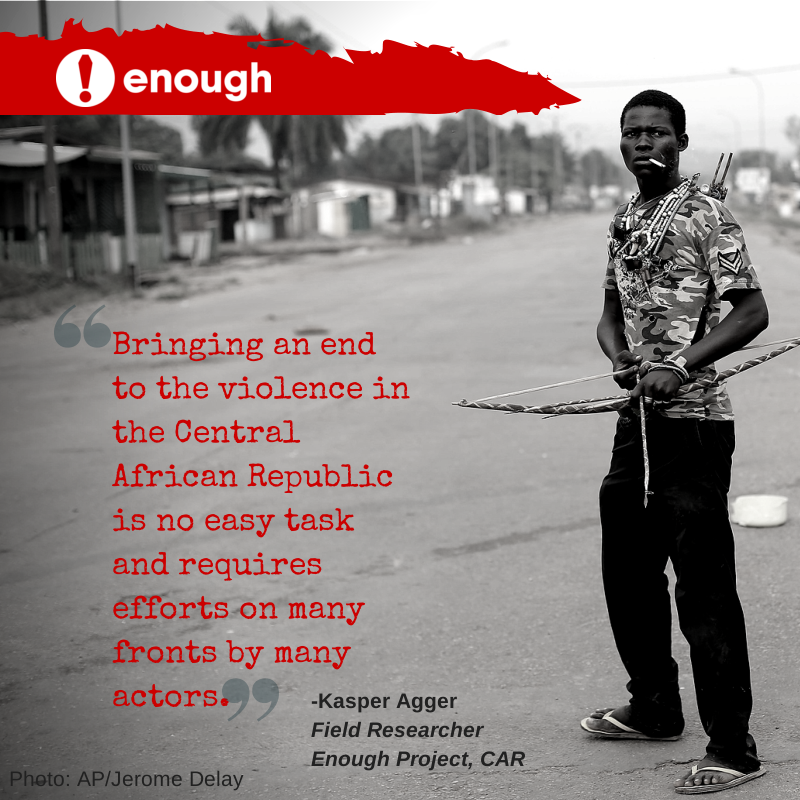
Since December 2013, the Central African Republic (CAR) has experienced extreme instability and violence, resulting in the death of at least 2,000 people, roughly 643,000 internally displaced persons, and an additional 100,000 refugees to the more than 200,000 that were already living in neighboring countries. While existing African Union and French forces have attempted to contain the fighting, peacemakers must think beyond immediate responses to the crisis. The violence will not end unless economic and political drivers of the conflict are addressed.
Following a recent trip to CAR, Kasper Agger, an Enough Project Field Researcher, has begun expanding Enough’s work on the prevention of genocide and crimes against humanity in Central Africa to include a focus on CAR. His new report, based on interviews in Bangui with Séléka, Anti-Balaka, and international figures, analyzes the underlying drivers of the conflict, including natural resource exploitation and regional dynamics, and identifies ways the international community can support sustainable peace and stability. Today, Thursday, May 1, Agger will be testifying at the House Foreign Affairs Subcommittee on Africa, Global Health, Global Human Rights, and International Organizations hearing, “The Central African Republic: From ‘Pre-genocide’ to Genocide?” about his findings. To read more about CAR’s history, see Enough’s CAR conflict page, and to learn more about what you can do to support peace, see Enough’s take action page.
The most recent bout of violence in CAR began in March 2013, when Michel Djotodia, supported by a loose rebel coalition known as Séléka, overthrew then-President François Bozizé. Djotodia and the Séléka gained supporters by exploiting frustrations over the concentration of power and wealth amongst Bozizé’s family and the underdevelopment of the northern region. Over the following months, the Séléka, predominantly made up of civilians from northern CAR and Muslim Sudanese and Chadian mercenaries, led brutal attacks against civilians. These spurred the creation of self-defense militias known as Anti-Balaka, who are currently targeting Muslim communities. The Anti-Balaka, who are mostly Christian, seek revenge for the acts of Séléka over the last year and perceive Muslims as Séléka collaborators. Although France and the African Union quickly deployed small forces to stabilize the country, and an interim government replaced former-President Djotodia in January, violence in CAR threatens the lives of millions.
While the conflict could appear to be religious in nature, “Behind the Headlines: Drivers of Violence in Central African Republic” argues that religion is an outcome, not a cause of the conflict. Past and current crises are the result of an internal struggle for state power, revenge, and access to natural resources of diamonds, ivory, oil, and timber. In addition, CAR is part of a regional conflict system where the country is destabilized because of the involvement of neighboring and international actors pursuing political and economic objectives.
For example, the report finds that armed groups in CAR are financing their activities in part with significant revenues from natural resources and lootings. Séléka rebels and their foreign fighters have been plundering, looting, and smuggling diamonds and ivory to pay for arms, fuel, food, and their soldiers. Meanwhile, Anti-Balaka militias have taken control of diamond rich areas in western CAR.
The report claims that other countries have also pursued economic interests in CAR. Chad aims to preserve oil interests, some of which lie on its border with CAR. CAR has not developed its oil fields on the border area, and now that Séléka is controlling that region of the country, CAR is again unable to develop oil revenues. While France has taken action to relieve massive humanitarian needs, it also has an interest in the uranium, oil, and timber sectors in CAR. The report also outlines Chinese and South African oil interests in CAR.
While the U.S. and U.N. have already stepped up their involvement, including through the appointment of Ambassador W. Stuart Symington as U.S. Special Representative for CAR and the approval of a full-fledged U.N. peacekeeping operation, peacemakers must adopt a regional approach to their diplomatic strategies in order to bring sustainable peace.
Enough Project Field Researcher and author of the report Kasper Agger says,
To prevent the number of dead bodies from growing in CAR, the U.S. and U.N. should support an inclusive peace process to break the deadly cycle of violence. The U.N. should send experienced mediators to work with interim President Samba-Panza to kick-start a political process with local dialogues and reconciliation across the country.
Agger plans to revisit CAR soon in order to continue Enough’s analysis into the drivers and facilitators of the conflict and to further develop proposals for how to build sustainable peace. However, in the interim, initial actions of the U.N., A.U., U.S., E.U., and regional government leaders should focus on the report’s recommendations, which include the following:
- The U.N. should deploy experienced mediators to work with U.S. Special Representative Symington and a diverse group of CAR leaders to spur a bottom-up peace process with CAR leaders, involving armed groups and civil society.
- The U.N. Panel of Experts, the U.N.-appointed Commission of Inquiry on CAR, and the International Criminal Court should coordinate investigations and pursue accountability for those most responsible for the violence in CAR, including those involved in sexual violence and economic criminal activity.
- The African Union should appoint a special envoy to address transnational security and economic matters that involve CAR, Sudan, and Chad.
- The African Union and the United Nations should mediate negotiations between the governments of Chad and CAR on a bilateral agreement for the exploration of the cross-border oilfields between the two states.
To learn more about CAR, watch "Drivers of War, Foundations of Peace: A Field Report from the Central African Republic" or read the report, "Behind the Headlines."
Help end the conflict in the Central African Republic: Take action now.
Photo: An Anti-Balaka militiaman holding a bow and arrow stands in, what days before, was a predominantly Muslim area of the Miskin district of Bangui, CAR (AP Photo).

